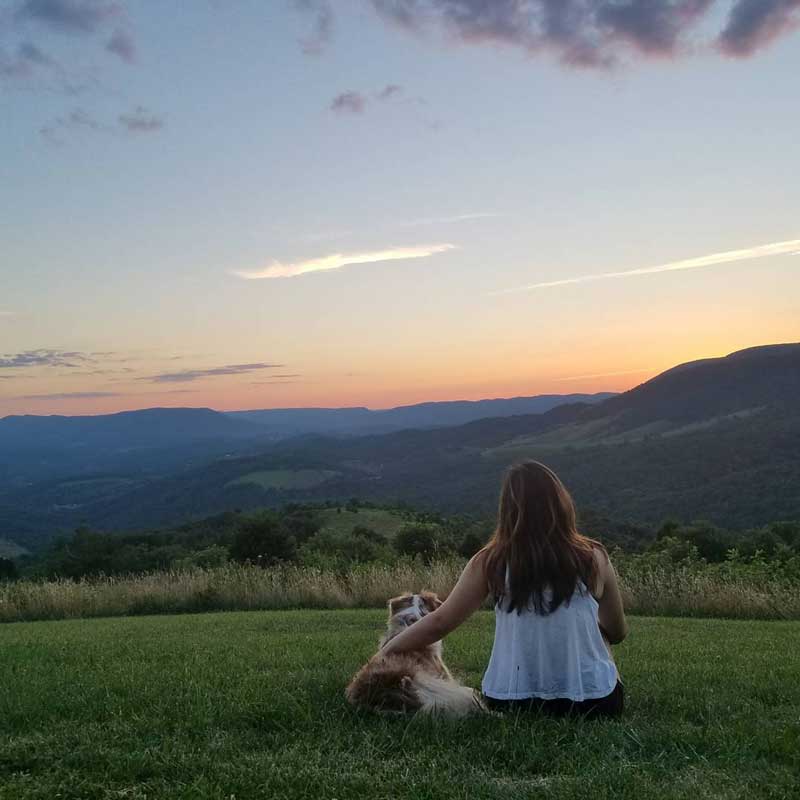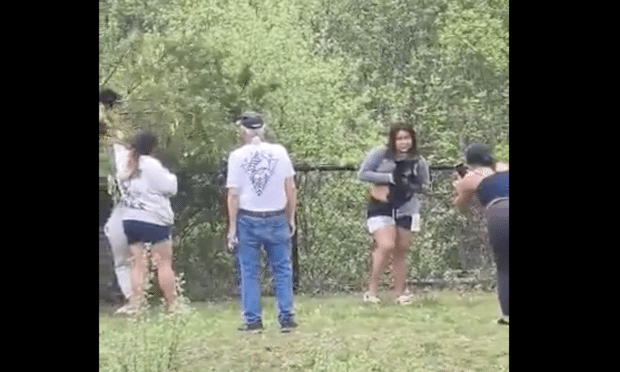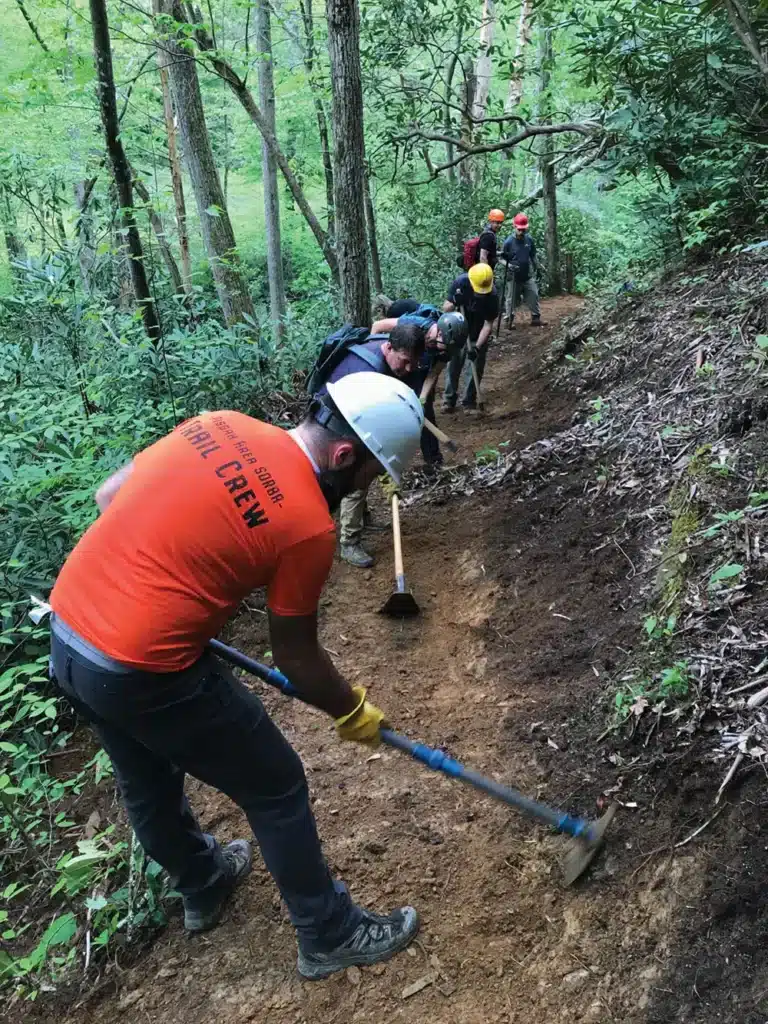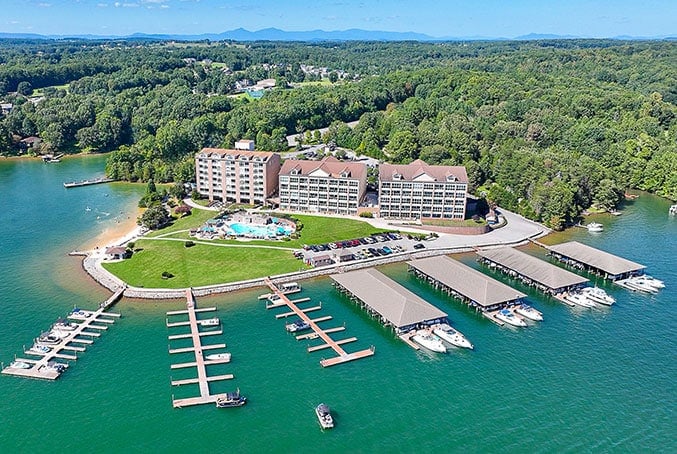Part 5: Labyrinth

The beeping of the EKG machines were testing the last remnants of my sanity. Chinese water torture in the form of sound, a shrill metronome marking the growing distance between myself and reality.
Forty-eight sleepless hours in the ICU. I was getting dizzy from scanning doctors’ faces as they passed, hoping for liberation from the purgatory of not knowing. The nurses were cheerful, but they always were. It was put on, of course. How could anyone be cheerful in this place straddled between life and death? Patients groaned in agony behind pink, plastic curtains, every room full of alien instruments, wires, and tubes.
They said he collapsed on his way out of the office to battle his way through rush hour. Some bystanders had given him CPR and used the defibrillator twice to get his heart started again. I hated thinking about him like that — surrounded by strangers from the vantage of the floor. Scared, confused. At least he wasn’t alone, I told myself.
I needed air, but I settled for nicotine. I stepped out for a punishing cigarette — smoked fast and burned hot. Maybe I needed it that way.
When I returned to the room, I found the curtains drawn. Sweeping them to the side, I was accosted by the sight of my father completely naked on the hospital gurney, sending me backpedaling to sit outside the door. The nurses emerged to explain he had vomited on himself and needed his gown changed. As the father of three girls, the man had been painstakingly modest about nudity, and somehow, after twenty-seven years of success, I bungled it on the last day. Small indignities of watching someone you love die.
The nurses left me again. I was determined this time to maintain my post, listening to the rhythmic click and sigh as the respirator filled his lungs with air. The balloon pump kept his heart beating. IV bags perched on shiny chrome racks dripped drugs into his bloodstream. So many damn machines — I wasn’t sure how much man remained.
At some point the beeping from the monitors indicated that his heart was racing. I looked over to the bed and his eyes met mine, opened for the first time since I arrived. He tried to speak, but the ventilation tube silenced his voice, his tongue swollen and purple from biting it when he hit the floor. His expression was one I’d never seen him wear: fear.
I didn’t know what to say, so I said nothing. Mom was back — when did she get back? — and held his hand and told him that we were here and we loved him. The nurse told me to hold his leg so he wouldn’t rip out his catheter. He looked hazy and sedated but he saw me. We saw each other. And then he closed his eyes for the last time.
—
A year and a half later on a frigid February day, I braced myself against blustery gusts of air, kicking myself for forgetting my hat and scarf in my truck. A brutal windstorm had torn through the Shenandoah Valley the previous night, bowing the windows of my apartment to the point I thought they might crack. Though the storm had passed, today’s windchill made the 40 degree air feel closer to 25.
Stepping over newly fallen trees, I trekked through the Edith J. Carrier Arboretum until I reached a clearing hidden by pines and lined with rocks. Carefully arranged, they formed a winding labyrinth for walking meditation. At the entry stood ecotherapist Pat Cheeks, who had arrived an hour before to clear fallen brush, collect litter, and tidy stones. We greeted each other and made small talk about last night’s crazy storm, soon circling back to the reason we were both standing out here in the cold.
“So what do you want to let go of?” she asked.
Cheeks is a woman who has spent her entire life dedicated to helping relieve pain — first as a nurse at the burn center at UVA hospital, as a volunteer for the Sexual Assault Resource Agency (SARA), and later as a psychiatric clinical nurse specialist.
After her experiences with survivors of trauma, Cheeks found surprising solutions for pain management besides the use of medication. Asking burn patients to imagine their body covered with cool river water, for example, took away some of the heat and pain. Eventually, Cheeks opened her own small business, Natural Transitions, to help clients adjust to major life changes using nature as a healing tool.
When I agreed to try one of her therapeutic exercises, she asked me to think about what no longer serves me in my life. What is holding me back?
“My dad,” I told her.
For months after my father died, I buried myself in the busyness of death — making calls to relatives and the utility companies, negotiating with the funeral home, writing the obituary, designing memorial cards, transferring car titles at the DMV, yelling at the HOA for harassing me about mildew on the side of his house.
Eventually, my list of things to do ran out. By then, it felt too late to grieve, inappropriate. I’d missed my window. In the stillness of everyday life, inconvenient emotions loomed in the foreground: anger, regret, sadness, confusion, fear, disappointment, resentment. And now I was finding them harder to ignore.
Cheeks nodded and produced a box from which she retrieved a lighter and a bundle of dried sage. Despite five minutes of joint effort, we weren’t able to keep the lighter aflame against the wind. Undeterred, she held the sage to my nose and told me to inhale. It was a grounding exercise, she explained. An effort to engage my senses and prime my brain to be mindful and notice the sights, sounds, and smells of the forest. “Plus, it’s cleansing,” she added.
As a science geek I’ve always been skeptical of things I cannot explain, and I’d never really given much thought to the merits of sage smudging. Still, I was determined to take this exercise one hundred percent seriously and, truth be told, something about the whole affair felt ceremonial. Official. (And, with a quick Google search after the exercise, I learned she was right.) With bits of sage tickling my nostrils, I took a deep breath.
“Now,” Cheeks instructed with a gentle voice, “Look around and choose a rock that represents what you want to release from your life. There isn’t a right or wrong answer.”
Immediately, I was drawn to a small pebble of black granite with stripes of white quartz scored along the surface. Holding it between my fingers, I considered it, admiring the contrast of colors, the strangeness of minerals cracked and reformed over millions of years. I placed it back on the ground. “That’s not it,” I said. I liked it too much.
“Good,” Cheeks encouraged. “Trust your instinct, but think about it carefully.”
In that moment I felt awkward and stupid. To me, all the stones looked basically the same. What made one better than another? It wasn’t logical, half of my brain yelled at me. Who cares what rock? Would it really make a difference? The other half of my brain berated me for being such a rigid square. Suspend the disbelief a little, why don’t you? My competing halves squabbled while my eyes scanned.
And sitting in plain sight, there it was. The stone was large, asymmetrical, gray, and ugly. Squatting to lift it, I cradled it in my forearms like an infant. A fat one — somewhere around 15 pounds. With its shape so ungainly, I found it difficult to hold, resting it partially against my pelvis for stability. Something to represent all those icky emotions I’d been avoiding for over a year. This thing would be hell to carry — it was the one.
“We’re going to set an intention now,” Cheeks explained. “As you walk through the labyrinth, focus your mind on what you want to release and visualize pouring it into that rock. When you get to the center of the labyrinth, place it down and give yourself permission to let it go.”
She pointed to the pile in the center of the labyrinth. “Once you can leave that stone behind, choose another to represent what you’d like to fill the space you’ve created by letting go of what no longer serves you. Meditate on that as you walk the same path out of the labyrinth.”
I nodded. At the entrance of the maze, Cheeks had laid a thin pine branch along the ground. It was the “threshold,” she explained, a physical barrier to represent the beginning and end of this emotional ritual. “Begin when you’re ready,” she said.
And with the wind whipping hair against my face, I crossed the threshold.
—
In theory, it was a rather simple exercise. But I was out of my depth and pre-occupied with the execution. How fast should I walk? How does one walk and meditate at the same time? Should I close my eyes?
For a moment I stood still and silent, cradling the rock to my chest. Icy air leeched into my lungs as I steadied my breath. It smelled faintly like Christmas, splintered branches bleeding their sweet, piney scent into the atmosphere. The staccato thrum of a woodpecker echoed from the distance.
What did I want to release? No right or wrong answers, I reminded myself.
His tongue. The image of my father’s purple, swollen tongue came into my mind. Poking between his lips when they removed the ventilation tube, dark in contrast to his pallid, lifeless skin. My heart ached at the memory. I didn’t want to remember him that way. I pictured the image seeping like a toxin from my fingertips into the rock. One step forward.
But this didn’t take away all the horrible memories. Like cracking Pandora’s box, snippets of horror rushed to the forefront of my brain.
When the doctor told us he was braindead with no possibility of recovery, my sister had reached for my hand. I shook my head ‘no,’ recoiling from human touch. I didn’t want to carry anyone else’s pain, I could barely manage my own. ’Bad sister’ flashed across my mind, though I’d long since apologized and been forgiven. Into the rock and one step forward.
The sound of a jackhammer in the distance interrupted my thoughts, ricocheting inside my skull. Anger bubbled inside me. How unfair, I thought. How am I supposed to immerse myself in nature with all that damn noise? Life’s not fair, came my father’s voice. One of his favorite phrases.
One of my first memories was through the bars of my baby sister’s crib. My mother had placed the three of us there while the EMTs hauled my father out of our apartment on a stretcher after his first heart attack. I was 4, he was 53.
“My ticker’s just not very good,” he explained when I was older.
“Why not?” I demanded to know.
“When you get old, things just wear out,” he said with a sigh.
“It’s not fair.”
“Life’s not fair, kiddo.”
The jackhammer stopped, but my heart was racing. I was furious. What did the man think he was doing having kids at that age? Didn’t he realize he wouldn’t be there when I needed him? When my truck was making that clanking noise, when I’d had a bad day at work, when I was proud of myself for life’s small accomplishments. Didn’t he realize I’d have no one to call?
One step forward.
With gravel crunching beneath my feet, I let it all go. In the last few years of his life, we’d grown distant. I had become tired of his nagging, prodding, pushing me to get a career, make something more of myself. “What are you doing with your life, Sarah?” he’d asked me. “You can’t kick the can down the road forever.”
“Just watch me,” I’d snapped.
One step forward.
Regret. Regret that I didn’t come see him on Father’s Day, the week before he died. He said he wasn’t feeling well, and didn’t want me to bother with the trip. I should have gone. I’d bought him a card with a drawing of three kids in the backseat of a van, dad in the front with a speech bubble that read, “Kids, remember when someone cuts you off, it’s okay to use your special finger!” Inside the card: “Thank you for teaching me the important things in life, Dad.”
As a man with chronic road rage, he would have loved it. I’d planned to give it to him the next time I saw him, but I never got the chance. It burned with the rest of him at the crematorium.
The cold raked my knuckles, white from carrying the heavy stone. It stole the heat from my fingers until they were completely numb. He was right, I thought. Life isn’t fair. I didn’t need that resentment, guilt, anger, and regret anymore. I didn’t need it leeching my warmth. A gust of wind rustled the branches of the evergreens above like the swish of long, sweeping dress. I closed my eyes and felt tears and sun on my face.
By the time I reached the center of the labyrinth, my forearms and biceps were shaking from fatigue. I was ready to put it down. In a way, it felt more final than when they put my father’s remains in the ground. At the funeral, my mother had hired photographers who stalked in the background, shutters clicking in my ears while I tossed a rose on top of his urn. My rage trumped my grief, unable to feel anything in the spotlight of spectators.
Here, in the wind and quiet, I took a moment with that heavy rock and placed a hand over its surface. Cold, rough. “Goodbye,” I whispered.
—
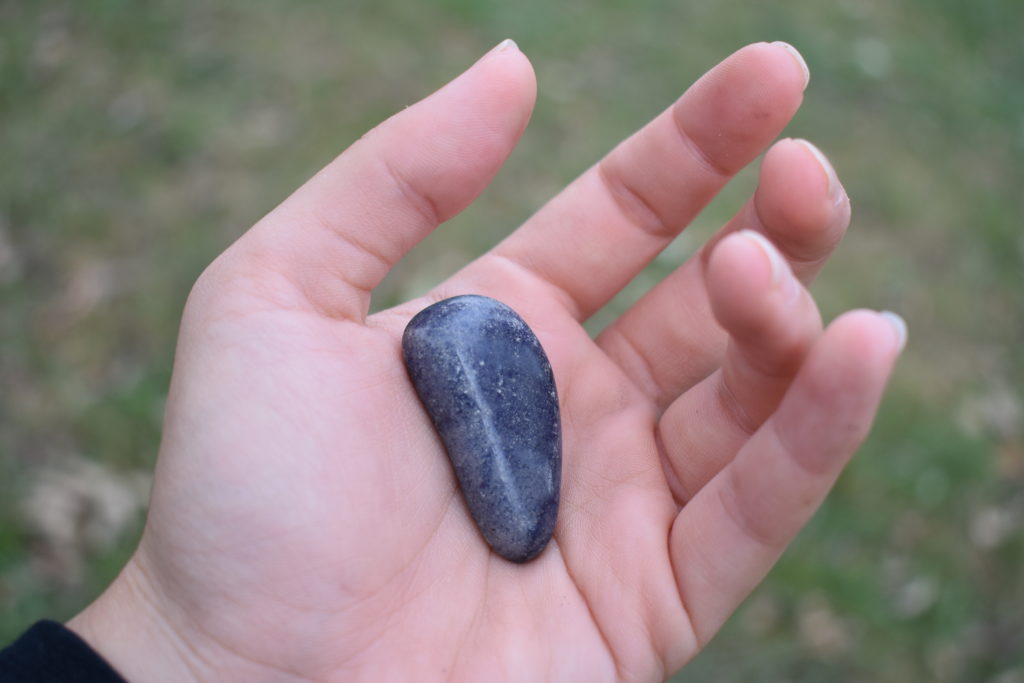
Photo credit: Sarah Vogel
At the center of the labyrinth, I searched for a stone to represent what I wanted to fill the void I’d created by leaving my pain behind. It wasn’t difficult. From the very top I plucked a smooth blue stone, clearly worn down after a millennia of water erosion. A river stone, like the ones my father and I would search for when we’d skip rocks on the lake.
I stood, straightening my back, feeling the relief in my muscles, the tension in my shoulders melting with my newfound lightness.
During my winding walk towards the center, I’d only heard the wind through dry branches and an occasional woodpecker. But now, the woods were alive with sounds of life that I’d been too preoccupied to notice — gentle chirps of female cardinals, returned by the more rambunctious twitter of the males. The rapid chip of the sparrow, the quick-fire, five-beat note of the Carolina wren. Squirrels skittered in helter skelter spirals around the trunks of oak trees, their barks and squeaks intermingling with birdsong. Even in winter when the world seemed shriveled and dead, life sprung from every tree hollow.
I held the blue pebble in my closed palm and pressed my fists into my pocket to warm my cracked, dry hands. Between my thumb and index finger, I rubbed its smooth surface like a prayer bead. And, in my own way, I prayed.
I didn’t know who I was praying to. Maybe the universe, maybe myself. It didn’t matter. I prayed for the strength to be a better sister, to take their hands the next time they needed me. I prayed for the patience to tackle my life’s problems even when I felt I had no one to call. I prayed for the wisdom to recognize I could be resourceful and perseverant, and that I did, in fact, have people who would pick up the phone when I needed someone. I prayed for forgiveness from myself.
I walked with shoulders back as I left that labyrinth behind, my dad’s voice still in my head. “Life’s not fair,” he’d said. And as I reached the end of the maze, I paused before crossing back over the threshold. The rest of our conversation flooded my mind.
At age six, the notion that life wasn’t fair didn’t seem good enough to me. “I think you should be here forever,” I told him, crossing my arms.
He chuckled but gave me a subdued smile. “Me too, but someday I won’t be around.”
My lip poked out in a pout, as though this fact were his fault. He nudged my chin with his knuckle, lifting my face to meet his gaze. “At the end of the day, we’re all worm food, and that’s the circle of life.”
I tried my best to understand. “Like the Lion King?” I asked.
He broke into a wide grin. “Yeah, just like that.”
And without warning, singing a barely recognizable rendition of The Circle of Life, he snatched me up by the armpits like Simba on Pride Rock. I’d laughed until I cried.
At the threshold, my hands now warm again, I felt the smooth stone in my pocket and filled it with the memory. With one last lungful of harsh but life-giving air, I stepped over that pine branch and back into the world.
